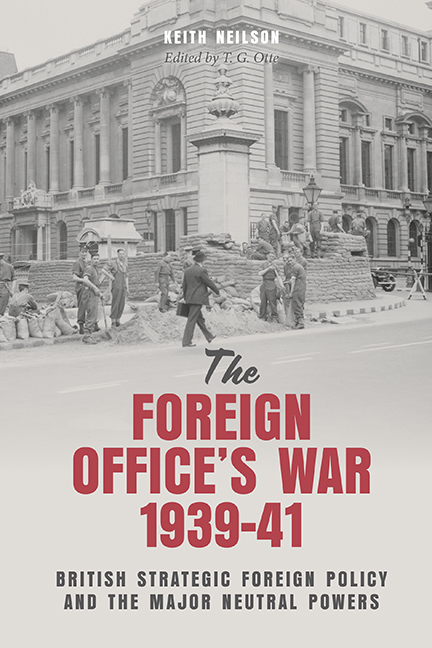Book contents
- Frontmatter
- Contents
- Preface and Acknowledgments
- List of Abbreviations
- Introduction: Keith Neilson and Modern International History
- 1 On the Eve of War: January to September 1939
- 2 The Baltic, Blockade and Soviet Russia: September 1939–June 1940
- 3 Defending the Mediterranean: Italy, Russia and the Balkans, September 1939–June 1940
- 4 Defending Britain and the Far East: The United States, Japan and Soviet Russia, September 1939–June 1940
- 5 ‘Nothing for nothing’: From the Fall of France to Operation Barbarossa: July 1940–June 1941
- Epilogue
- Appendix I Members of the American, Central, Eastern, Far Eastern, Northern and Southern Departments, 1939–41
- Appendix II Dramatis Personae
- Appendix III Keith Neilson, List of Publications
- Bibliography
- Index
Introduction: Keith Neilson and Modern International History
Published online by Cambridge University Press: 16 July 2022
- Frontmatter
- Contents
- Preface and Acknowledgments
- List of Abbreviations
- Introduction: Keith Neilson and Modern International History
- 1 On the Eve of War: January to September 1939
- 2 The Baltic, Blockade and Soviet Russia: September 1939–June 1940
- 3 Defending the Mediterranean: Italy, Russia and the Balkans, September 1939–June 1940
- 4 Defending Britain and the Far East: The United States, Japan and Soviet Russia, September 1939–June 1940
- 5 ‘Nothing for nothing’: From the Fall of France to Operation Barbarossa: July 1940–June 1941
- Epilogue
- Appendix I Members of the American, Central, Eastern, Far Eastern, Northern and Southern Departments, 1939–41
- Appendix II Dramatis Personae
- Appendix III Keith Neilson, List of Publications
- Bibliography
- Index
Summary
Having ‘a poor sort of memory’ is not the problem for historians. Indeed, the problem is rather the reverse. Like the White Queen’s, historians’ memories work in two directions; they know in advance how the events they study turn out. Thus, they find themselves drawn to the conclusion that what did happen was inevitable. But such foreknowledge was denied to those who participated in the events themselves.
Keith NeilsonThe work of a historian is never done. The very nature of history ensures that this is so. Past events are not frozen in time. Evidence pertaining to them is never complete, hardly ever incontrovertible, and so capable of often sharply contrasting interpretations. Rooted in the present, the historian watches the object of his studies recede, steadily and ineluctably. All he can do is to dig further, probe more widely and ask different, yet more searching questions to retrieve a little more of the past, its complex and changing contexts, always knowing that, ultimately, it will elude his grasp. When discussing such matters, Keith Neilson was fond of quoting Günter Grass, the German novelist, who in his memoir of his own uncertain past likened interrogating it to peeling an onion. He argued ‘that “when pestered with questions, memory is like an onion that wishes to be peeled so we can read what is laid bare letter by letter. It is seldom unambiguous and often in mirror-writing or otherwise disguised.”’ Keith thought ‘that we should take this advice to heart and continue to peel the onion’.
Sometimes, however, the work is left undone because, more prosaically and yet more cruelly, the life of the historian is cut short just at the moment when his latest work nears completion. This is also the case with The Foreign Office's War, 1939–41, which Keith left behind, when he died in April 2015, shortly after retiring as Professor of History at the Royal Military College of Canada (Collège militaire royal du Canada) (RMC). He had devoted much of his life to the study of great power politics, and more especially the British Foreign Office and the service departments in Whitehall, the mores and mentalities of diplomats, officials and their political masters with particular reference to their dealings with Russia, both in her Tsarist and her Soviet guises.
Historians bring to their work a distinct perspective, reflecting their own background and upbringing and conditioned by their generational experiences.
- Type
- Chapter
- Information
- The Foreign Office's War, 1939-41British Strategic Foreign Policy and the Major Neutral Powers, pp. 1 - 22Publisher: Boydell & BrewerPrint publication year: 2022

